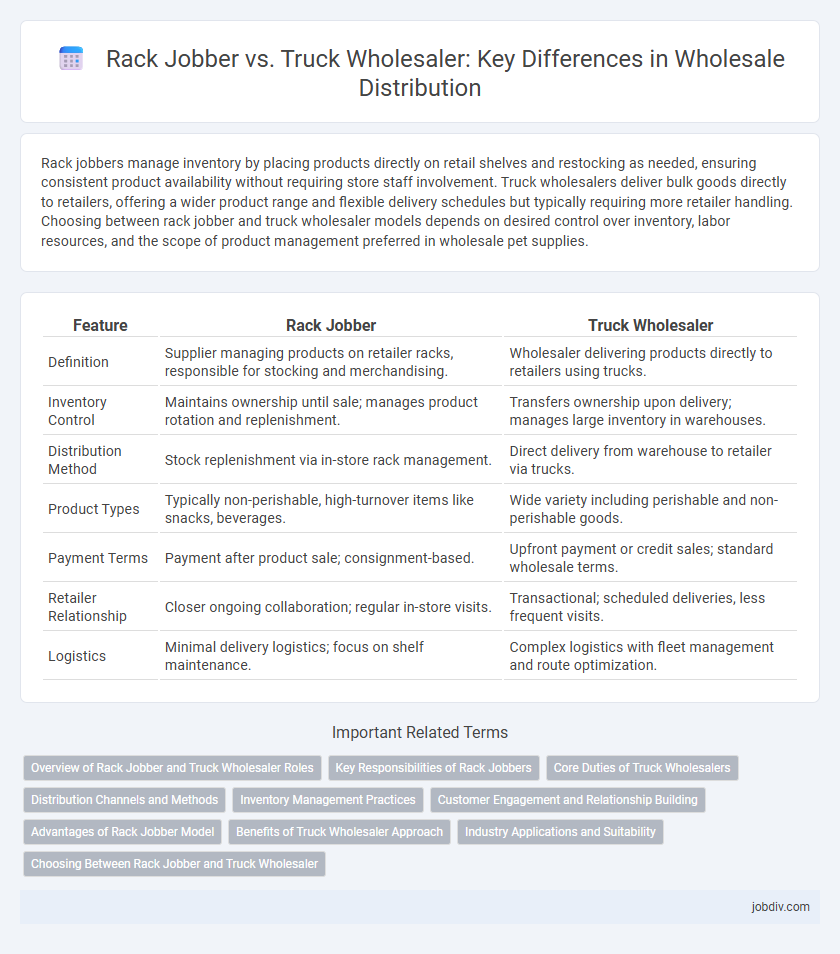Rack jobbers manage inventory by placing products directly on retail shelves and restocking as needed, ensuring consistent product availability without requiring store staff involvement. Truck wholesalers deliver bulk goods directly to retailers, offering a wider product range and flexible delivery schedules but typically requiring more retailer handling. Choosing between rack jobber and truck wholesaler models depends on desired control over inventory, labor resources, and the scope of product management preferred in wholesale pet supplies.
Table of Comparison
| Feature | Rack Jobber | Truck Wholesaler |
|---|---|---|
| Definition | Supplier managing products on retailer racks, responsible for stocking and merchandising. | Wholesaler delivering products directly to retailers using trucks. |
| Inventory Control | Maintains ownership until sale; manages product rotation and replenishment. | Transfers ownership upon delivery; manages large inventory in warehouses. |
| Distribution Method | Stock replenishment via in-store rack management. | Direct delivery from warehouse to retailer via trucks. |
| Product Types | Typically non-perishable, high-turnover items like snacks, beverages. | Wide variety including perishable and non-perishable goods. |
| Payment Terms | Payment after product sale; consignment-based. | Upfront payment or credit sales; standard wholesale terms. |
| Retailer Relationship | Closer ongoing collaboration; regular in-store visits. | Transactional; scheduled deliveries, less frequent visits. |
| Logistics | Minimal delivery logistics; focus on shelf maintenance. | Complex logistics with fleet management and route optimization. |
Overview of Rack Jobber and Truck Wholesaler Roles
Rack jobbers manage inventory by supplying and stocking products directly on retailer shelves, streamlining product placement and replenishment. Truck wholesalers operate from mobile warehouses, delivering bulk goods efficiently to various retail locations while handling storage and distribution. Both roles enhance supply chain dynamics but differ in inventory management and delivery execution methods.
Key Responsibilities of Rack Jobbers
Rack jobbers primarily manage inventory placement and merchandising within retail stores, ensuring products are stocked, organized, and replenished consistently. They maintain direct relationships with store personnel to optimize shelf space and product visibility for better consumer access. Their responsibilities also include monitoring sales trends and updating product assortments to align with market demand and seasonal changes.
Core Duties of Truck Wholesalers
Truck wholesalers specialize in the transportation and direct delivery of products from warehouses to retail locations, managing inventory on wheels to ensure timely replenishment. They maintain strong logistical capabilities, coordinate route planning, and handle merchandising at point of sale to maximize product visibility. Unlike rack jobbers who manage in-store inventory and displays, truck wholesalers prioritize distribution efficiency and stock management across multiple retail outlets.
Distribution Channels and Methods
Rack jobbers distribute products through retail stores by managing inventory and merchandising directly on store racks, optimizing shelf space and product visibility. Truck wholesalers utilize mobile distribution, delivering goods directly to retailers via trucks, enabling frequent replenishment and flexible route management. Both methods enhance supply chain efficiency but differ in inventory control and customer interaction approaches within wholesale distribution channels.
Inventory Management Practices
Rack jobbers organize inventory by placing products directly on retail shelves, maintaining ownership until sold to consumers, which allows for real-time stock adjustments and minimizes retailer burden. Truck wholesalers manage inventory through mobile distribution, delivering bulk products to retailers and handling stock replenishment on-site, optimizing inventory turnover and reducing storage needs. Both models prioritize efficient inventory tracking, but rack jobbers emphasize shelf-level control while truck wholesalers focus on flexible, location-based stock management.
Customer Engagement and Relationship Building
Rack jobbers enhance customer engagement by managing in-store merchandising and inventory, allowing retailers to focus on sales while ensuring product availability and freshness. Truck wholesalers build relationships through direct, frequent deliveries and personal interactions with retailers, fostering trust and immediate feedback. Both models optimize customer relationships but differ in touchpoints, with rack jobbers emphasizing consistent product presence and truck wholesalers prioritizing personalized service.
Advantages of Rack Jobber Model
The rack jobber model offers superior inventory control by managing product restocking and merchandising directly within retail stores, reducing stockouts and improving shelf presentation. This hands-on approach enables efficient product rotation and tailored assortment based on specific store demand patterns, boosting sales through optimized placement. Rack jobbers also reduce retailer labor costs and administrative burden, as they handle product delivery, stocking, and invoicing independently.
Benefits of Truck Wholesaler Approach
Truck wholesalers enhance supply chain efficiency by delivering directly to retail locations, reducing inventory holding costs and minimizing stockouts. Their mobile distribution model accelerates replenishment cycles, ensuring fresher products and improved shelf availability compared to rack jobbers. Leveraging real-time route optimization, truck wholesalers maximize delivery frequency and coverage, boosting overall sales and customer satisfaction.
Industry Applications and Suitability
Rack jobbers excel in retail environments such as grocery stores and pharmacies by managing inventory on shelves, ensuring product availability and presentation without requiring store staff involvement. Truck wholesalers are optimal for industries needing rapid restocking and large-volume deliveries, including convenience stores, food service providers, and small retailers. While rack jobbers suit stable, small-scale retail settings, truck wholesalers cater to dynamic, high-demand markets requiring flexible distribution and on-the-go inventory replenishment.
Choosing Between Rack Jobber and Truck Wholesaler
Choosing between a rack jobber and a truck wholesaler depends on inventory control preferences and product placement strategies in retail stores. Rack jobbers manage and stock products directly on retail shelves, optimizing shelf space and reducing retailers' inventory risk, while truck wholesalers deliver bulk goods to retailers who handle their own stocking and inventory management. Businesses prioritizing hands-off inventory solutions may prefer rack jobbers, whereas those wanting greater control over stock levels often opt for truck wholesalers.
Rack Jobber vs Truck Wholesaler Infographic

 jobdiv.com
jobdiv.com